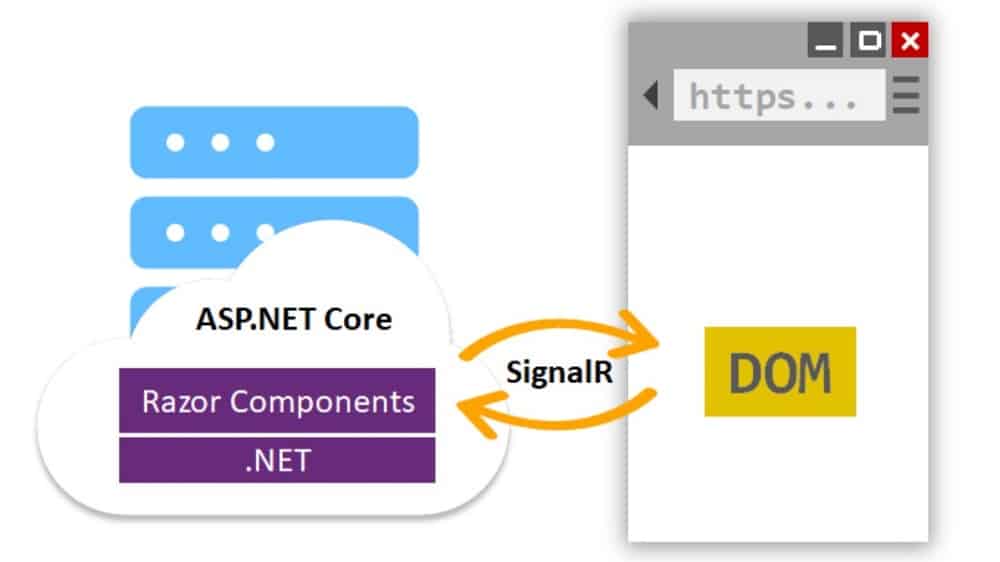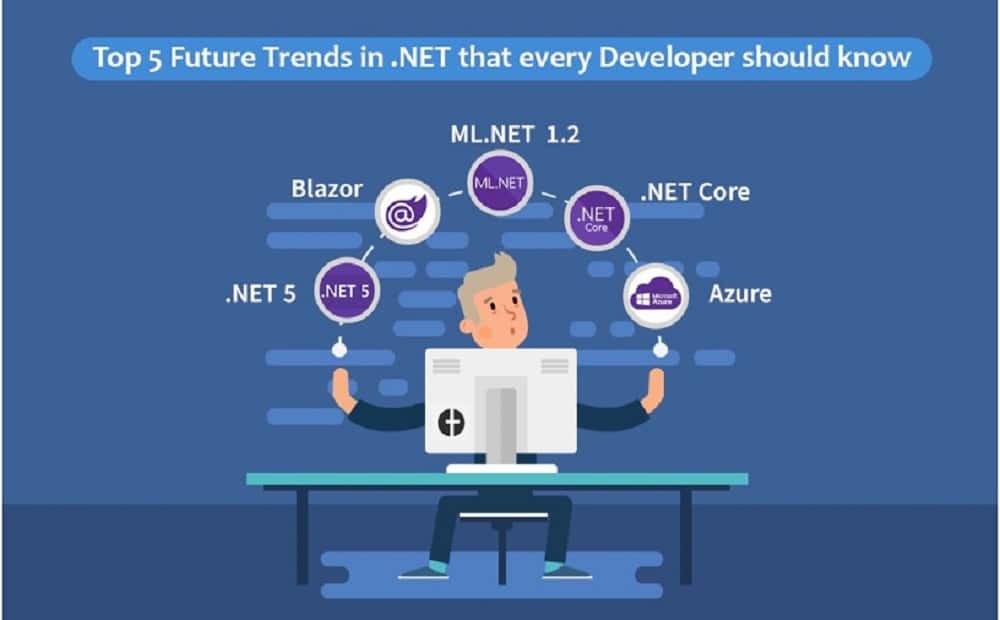
The IT industry has always been dynamic; however, the speed of change has never been as fast as what IT professionals have experienced in their careers today.
In my 30 years of experience, exceptional Microsoft developers have always been in demand. However, with Microsoft advancing their software offerings many MS Developers are asking themselves what emerging MS tools are going to be the best long term skill to develop and which ones could just be a flash in the pan. What could happen if you picked the wrong MS skill set?\
You may find your career will start to stall, get passed over for highly visible projects, or find your merit raises less than they have been prior.
So what can you do right now to prepare for the future of MS development and keep your compensation trajectory on the right path? Here are the top five skills that hiring managers ask me to look for in their new developers.
1. Get familiar with .NET Core

Currently most hiring managers are saying .NET Core is a “nice to have” or “desired” skill, but based on what I am hearing it will soon become a “must have”.
.NET Core is the next generation in the MS Stack and software development wave. A CIO has mentioned to me how she’s leveraging .NET Core and the technology’s ability to be truly cross-platform compatible. This gives the many .NET Core developers in the Northeast Ohio area the opportunity to leverage their software development skills into previously open source companies.
In recent tests, .NET Core outperformed NodeJS and GO 8x. The cost savings from performance like this is incredibly valuable for companies. Another aspect that is pushing companies towards .NET Core is its ability to not be tied solely to the MS platform, allowing them to find best of breed infrastructure solutions that are specifically aligned for the company’s enterprise software. Microsoft is marketing .NET Core aggressively and making significant in-roads into non-Microsoft shops. It is hard to fight this trend, but many hiring managers predict in 3-4 years it will become a requirement for most MS Developers.
It’s important to get ahead of the curve. If your current environment is not using .NET Core yet, I suggest building a side project of your own using .NET Core and host it on GitHub. This will allow you to get practice using the framework and its new features, but also give an example you can show potential hiring managers.
I’ve compiled a few resources for you to learn .NET core below. But as I stated before, in my experience with working with employers the best way you can learn is through experience.
- Learn .NET Core with real world examples Udemy
- Learn .NET Core with Microsoft Tutorials
- Learn .NET Core with tutorialspoint core tutorial
2. Learn about Azure

Employers highly value a C# / .NET Developer who has experience working with Microsoft Cloud Services. You do not need to become a full fledged cloud engineer. However, what I have heard from hiring managers is that C# / .NET Developer resumes move to the top of the stack if they have MS Cloud Services / Azure on them. Why is that?
Many employers use or are piloting Azure as their web hosting service, but don’t have a full cloud engineer on staff. However, many times there will be a few small projects that an organization needs to conduct related to Azure. For example, an organization may need to integrate or bridge their software to connect to the cloud. Most of the time, organizations will have to pay Microsoft or a consulting firm a high consulting fee to write these scripts. By having cloud services knowledge and experience you’re able to help with the integration, save your employer time and money on consulting fees, and become known as a go to person on Azure related projects.
Hiring managers have told me they look for a blended background of C# / .NET and Azure experience because they have the ability to troubleshoot issues quickly. Developers with these dual skills are able to detect if the issue is stemming from the code side or the infrastructure side. Having that resource in house helps organizations identify problems faster which results in getting the application back up and running for their business, employees or end-consumers much faster.
How can you start to learn azure?
Based on Microsoft’s community, Azure isn’t too difficult to learn. Here are a few resources for you to learn Microsoft Azure.
As stated earlier, courses and books are a great start to learn the material, however setting an instance on your home network or a side project to prove to employers your ability to use Azure creates a bigger impact with hiring managers.
- Cloud Academy Microsoft Azure Training Library
- Cloud Guru Micro Azure Training Library
- The Complete Azure Web Developer Course Learn The Essentials Udemy
- Microsoft Azure Certification Training
3. Increase your full stack abilities

Taking a business concept and having the ability to code the application from front-end to the back-end is perhaps the number one skill I hear employers wish their .NET / C# developers had. End-to-end developers aren’t only very sought after by employers, but this also allows you to have multiple career options.
You don’t have to be as skilled or experienced as a full UI/UX developer. However, you do want to have good knowledge and experience in key front-end languages and frameworks. Here is a list of front-end languages you want to consider getting experience in.
- React
- Node.JS
- Angular.JS
- Vue.JS
Based on a 2020 Gartner group study, a full stack MS Developer is currently the number one sought after development skill.
I have compiled a list of books and courses to help you start to learn the front-end to become a full stack developer.
- 16 Book Full Stack Library
- Learn Vue.JS 2
- Learn Angular and NodeJS
- Learn HTML and CSS
- Learn React
- Learn .NET Core
It is important to know that employers do not hire you because of online courses you take, but because the self-starter personality and willingness to always continue to learn.
Therefore, when going through the courses, my advice is to apply these ideas in your current job or as a side project.
4. Upgrade your identity frameworks you work with

As the cliché goes: “out with the old and in with the new ”. This is true when it comes to .NET / C# development. If you continue to use old frameworks, it becomes challenging to increase productivity and makes it harder for you to have a competitive advantage in the market.
From talking with various hiring managers and CIOs, here are the most sought-after tools, frameworks, and apps they want their .NET / C# developers to have:
You can start to learn these tools, frameworks and apps by taking the following courses below. My suggestion, again, is to apply these ideas in your current role or as a side project.
- Programming in Blazor with Udemy
- Introduction to ML.NET with Udemy
- Learning EF Core with Udemy
- Learn the basic of MSIX with Microsoft
5. Embrace the new frontier of hyper automation utilizing RPA

What exactly is hyper automation and how does it relate to RPA?
Gartner describes hyper automation as “an approach in which organizations rapidly identify and automate as many business processes as possible. It involves the use of a combination of technical tools, including but not limited to machine learning, package software and automation tools to deliver work.” RPA stands for robotic process automation and is a very powerful tool that is used by businesses which allows organizations to achieve hyper automation. Specifically, RPA allows developers to configure bots. Then these bots are used to mimic tasks in a business process. Think of hyper automation as an organizational goal and RPA is a key tool to achieve this goal.
So why should you as a C# / .NET Developer learn RPA?
From talking with CIOs, CTOs and other .NET / C# developers, many companies, who are on the frontier of technology, are or want to be implementing hyper automation utilizing RPA. I have found that .NET / C# developers who have experience working with RPA are highly sought after by employers and in return are compensated for that.
But don’t just take my word for it. Gartner’s 2020 prediction report cites that:
- By 2024, organizations will lower operational costs by 30% by combining hyper automation technologies with redesigned operational processes.
- By 2023, there will be a 30% increase in the use of RPA for front-office functions (sales and customer experience).
- The RPA software market grew over 60% in 2018 which makes it the fastest-growing enterprise software segment.
Based on what I’ve seen and heard from CIOs and CTOs, .NET developers who are able to use RPA to automate various business processes are highly sought after.
It is important to know that not all RPA script writing is the same and some are starting to decline. Conversely, dynamically generated RPA scripts are increasing in demand as this allows for faster implementation. Therefore, as a developer it is important you learn how to dynamically generate RPA scripts.
But how do you learn RPA to help your organization achieve hyper automation? I have compiled a list of 5 online training programs to help you learn RPA.
- UiPath Academy
- Learn the basics of RPA and UiPAth in this free course.
- RPA Academy
- This site allows you to choose from various options such as online or in class.
- Udemy RPA
- This course helps you become well-rounded to allow you to understand the foundations of RPA.
- RPA Training by Multisoft
- This course will help you understand the fundamentals of automation and other RPA concepts. You will even receive a certification from Multisoft after you complete this course.
- Edureka RPA Advanced Training
- This course is at a more advanced level and will allow you to use RPA in your organization.
It is important to know that learning RPA and other hyper automation tools is a lifelong journey. The more complex business processes you work on automating, the more knowledge you will need.
Embrace change!
In our ever changing work climate, it is important to always consider learning the technology that you’re passionate about.
We know that there is a lot for you to consider here and it can seem overwhelming. It is important to just pick one or two aspects to focus on and apply it to your current role or a side project.
If you are interested in learning more about the current market trends or opportunities in the C# / .NET development space feel free to schedule a call with one of our recruiters using the link here.

